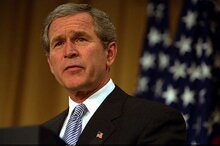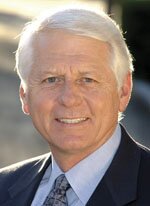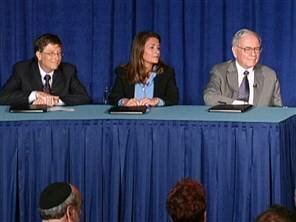With the emergence of the video 
from the Associated Press concerning Bush's warning before Katrina I wanted to share this interview from Brian Williams of NBC with former FEMA head, Michael Brown. You could say that this is coming from a disgruntled former employee who got the ax for administrative bungling and lack of leadership, but I think that it is more than that. The days following Katrina were some of the worst in our country in the past 30 years. Although I voted for Bush twice and am a life-long Republican, I am terribly disappointed with the Federal response to the disaster and do not have a lot of patience with the "blame the local politicians for everything" attitude that conservatives have used. If this had happened under Clinton, Rush Limbaugh and Sean Hannity would have been screaming to high heaven as this being another example of liberal imcompetence. I am really interested in right being right and wrong being wrong, despite your political party. Let's admit mistakes and work together to fix them. But, let's not blame everyone else and then make false promises to rebuild and then move on. Read the interview for yourself and draw your own conclusions:
Michael Brown: I was ‘left on the battlefield’
Ex-FEMA head says he either fell or was pushed on his sword after Katrina
• Michael Brown: Fall guy?
Feb. 27: Former FEMA director Michael Brown talks to NBC's Brian Williams about losing his job in the wake of Hurricane Katrina.
NBC News
Updated: 7:52 p.m. ET Feb. 27, 2006
Former FEMA director Michael Brown sat down with Brian Williams on Feb. 24 for his first network television interview since resigning in the wake of Hurricane Katrina. "NBC Nightly News" aired a brief portion of the interview on that day. You can read it by clicking here. The broadcast will feature more from the exclusive interview on Tues., Feb. 28.
Brian Williams: When did you realize that there was a complete disconnect between what you were saying and the situation on the ground?
Michael Brown: On Tuesday, August 30th, sometime in the morning, there was a secure conference call, and the president takes control of that call and pretty much shuts everybody up and says, "I need to hear from Brown right now what's going on." And I remember my first words to him were, "Mr. President, my estimate is that 90 percent — 90 percent — of the population of New Orleans has now been displaced." And there was just that split second of silence. And [then], "90 percent?" "Yes sir, I believe it is that bad. That's how bad it is." I really thought that would get just the whole mechanism of the federal government to come charging in. There are e-mail traffics of my conversations about my fear about this being the "Big One." Everyone should've known what we were facing.
Williams: Why aren't you shouting from the mountaintops?
Brown: I did. And I want to show you an e-mail where I am screaming at my staff in this e-mail: "Where is the Army?" I've talked to them about the Army; I want the Army now. "Where the hell are they? Why haven't they shown up yet?"
Williams: Millions of Americans kept asking, "Are they not watching the same pictures we're watching?"
Brown: One of the mistakes that I've owned up to was this whole mentality that exists in Washington, D.C. — that you get your talking points. And, by God, you stick to your talking points. And what I should have done was gone to the American people — instead of putting my arm around Governor Blanco and talking about how wonderfully things are working — we should have told them: "This is a disaster of the magnitude that this country has never seen. We are struggling. We're gonna do everything we can to help make this thing better. We're gonna call in all the resources. We need your patience and understanding" — and paint them a realistic picture. You see, I believe that people in D.C. don't believe that the American people can handle the truth.
Williams: You are, like it or not, part of the American lexicon because of a phrase uttered by the president of the United States. Take me back to that day — that moment — he's standing next to you, you heard him say it. Did you still think you could win this?
Brown: I did. I really thought I could still win it, because all I needed was for DOD to come in and help me with logistics — establish a new supply chain for materials. And I knew that we could do that, because that's what FEMA does. And when the president turned, he said, "Brownie, you're doing a heck of a job." I really thought to myself he's being typically presidential; that's what he tends to do. But I also thought that it was going to irritate some people.
Williams: Why?
Brown: Because, suddenly, I was part of the inner circle. Do you know how many people in the country — how many people in the world — call me "Brownie?" One.
Williams: Why was yours the only head to roll after Katrina?
Brown: Part of being a presidential appointee is that you have to be willing to fall on the sword for the president of the United States. And, clearly, I either fell on the sword or was pushed on the sword. I'll leave that for others to make that judgment. And so, I think that I was made a scapegoat, in that regard. Most always, though, really, they never leave their wounded or their dead on the battlefield. And, in this case, I'm willing to take the fall for the president, but I wish I hadn't been left on the battlefield.
Brian Williams: People down in the Gulf Region feel that a lot of you have blood on your hands. People were left in that Superdome for a week. It was an awful situation. Who bears the responsibility for this?
Michael Brown: Well, I think that we all do.
Williams: Where is the aid? It's the question people are asking us today on camera.
Brown: Brian, it's an absolutely fair question - and I gotta tell you from the bottom of my heart how sad I feel for those people the federal government just learned about those people today.
Williams: I couldn't believe my ears, when you answered me that this was the first that you were hearing of it. Why weren't you people watching the television coverage that was on around the clock of the biggest natural disaster in American history?
Brown: We were. And we knew about it. And I had literally been up for about 24 hours. But, when I said to you-- "Yes, we just learned about it"-- what I meant was I had just learned about it 24 hours ago. It was still the same day to me. They didn't see that, at the same time that we were seeing bodies in the water, there were many men of the urban search and rescue teams, members of the United States army, and members of the United States Coast Guard rescuing people.
Williams: Were you truly qualified to run FEMA?
Brown: Yes.
Williams: Why?
Brown: From the time that I served on the transition team, up until Hurricane Katrina, I successfully handled over 160 presidential-declared disasters.
Williams: How did your years as the head of an Arabian Horse Association prepare you to deal with 80 percent of the city of New Orleans underwater?
Brown: Because that whole tenure period I acted, in essence, as an attorney. It was not running horse shows. It was not judging horses. I was, in essence, the counsel that did the investigations and the prosecution of wrongdoing. Making sure that systems worked.
Williams: If I were Michael Chertoff sitting here across from you, what would you say to me, honestly?
Brown: I'm exceptionally angry. I think you made a horrible mistake by telling me that I had to stay in Baton Rouge. That showed a little bit of naivete about how disasters need to be run and operated and managed. And I hope now that you will go back and reread the memos, the plans, the ideas that I set forth about how we can make this system work for the American people and that you'll implement those. And if you don't and you're not willing to do that then perhaps you need to move on too.
Williams: It's unbelievable. It's hard to believe that six months ago that was us.
Brown: How do you think-- how do you think I felt Brian? How do you think I felt sitting there, one leg strapped to a chair in Baton Rouge not able to get out and crack the whip, and-- and scream and holler.
Williams: But do you pick up the phone and say, "Get me some airlift pallets of food and water to these people"?
Brown: Yeah. You do. And I think if you interviewed my staff you they would tell you about my screaming phone calls.
If we don't learn from this, and go back to the things that I was saying over the past three or four years about doing serious catastrophic disaster planning, and making certain that the emergency management system in this country works, then those people will have suffered in vain.
I will have been scapegoated for nothing. If we don't learn from this, then shame on us.
© 2006 MSNBC Interactive
 Monsoons have hit Northern India hard and hundreds of villages are submerged. The northern state of Uttar Pradesh has been hit extremely hard. This is near the area that we have been going and I have travelled through Uttar Pradesh by car as well as by train. It is a huge state, but according to the map, the entire area where we have visited has been hit extremely hard by the monsoons with much flooding, many refugees, food shortages, and general devastation. Please pray for these people tonight and pray that the Christians in this area will be helped and will be able to help others. It is hard enough to live there when things are going normally. I can't imagine what it would be like when there is a natural disaster. We also have many missionaries in that area, so pray that they would be able to be a witness as well as be taken care of.
Monsoons have hit Northern India hard and hundreds of villages are submerged. The northern state of Uttar Pradesh has been hit extremely hard. This is near the area that we have been going and I have travelled through Uttar Pradesh by car as well as by train. It is a huge state, but according to the map, the entire area where we have visited has been hit extremely hard by the monsoons with much flooding, many refugees, food shortages, and general devastation. Please pray for these people tonight and pray that the Christians in this area will be helped and will be able to help others. It is hard enough to live there when things are going normally. I can't imagine what it would be like when there is a natural disaster. We also have many missionaries in that area, so pray that they would be able to be a witness as well as be taken care of.














 Yesterday, I ran across an interview that outgoing SBC President Dr. Bobby Welch gave after the convention in Greensboro (HT: John Stickley). As many of you know, there was a resolution that was passed against the consumption, use, manufacturing, and sale of alcoholic beverages. Obviously, every Baptist is against drunkeness and agrees with the Biblical prohibitions regarding that issue. That is not what the debate has been about. The debate has concerned whether it is permissable for a Christian to have even a glass of wine on a rare occasion. The resolutions says "No." Many have countered the resolution by pointing out that there is no Biblical injunction against having a small amount of alcohol in moderation and even Jesus turned water to wine. Anyway, it has been a big debate and I have been kind of bored by it because everyone just snipes at each other and no one really listens, it seems. I have tried to stay out of this debate to follow the admonition of
Yesterday, I ran across an interview that outgoing SBC President Dr. Bobby Welch gave after the convention in Greensboro (HT: John Stickley). As many of you know, there was a resolution that was passed against the consumption, use, manufacturing, and sale of alcoholic beverages. Obviously, every Baptist is against drunkeness and agrees with the Biblical prohibitions regarding that issue. That is not what the debate has been about. The debate has concerned whether it is permissable for a Christian to have even a glass of wine on a rare occasion. The resolutions says "No." Many have countered the resolution by pointing out that there is no Biblical injunction against having a small amount of alcohol in moderation and even Jesus turned water to wine. Anyway, it has been a big debate and I have been kind of bored by it because everyone just snipes at each other and no one really listens, it seems. I have tried to stay out of this debate to follow the admonition of  A
A  The other day, while reading Bernard Lewis'
The other day, while reading Bernard Lewis'  There is just something about us that loves to point out the flaws of others and pile on. I know that the liberal media is overjoyed to hear about
There is just something about us that loves to point out the flaws of others and pile on. I know that the liberal media is overjoyed to hear about  Does anyone else feel a sinking sense of dred about what is going on in the Middle East?
Does anyone else feel a sinking sense of dred about what is going on in the Middle East? 
 With the resolution against alcohol consumption at this year's Southern Baptist Convention Annual Meeting in Greensboro, NC because of it's harmful effects, should we expect a similar resolution against smoking at next year's annual meeting in San Antonio based on this article?
With the resolution against alcohol consumption at this year's Southern Baptist Convention Annual Meeting in Greensboro, NC because of it's harmful effects, should we expect a similar resolution against smoking at next year's annual meeting in San Antonio based on this article?
 wondered if there would be other attacks or crackdowns by the Israeli's against the Palestinians. I was staying in a British hotel at David's Gate at the time and had a chance to offer condolences to the British nationals that were both working and staying there. It was an interesting time, to say the least. I was very concerned about my friend, because he took the tube from King's Cross to work. I later found out he was alright.
wondered if there would be other attacks or crackdowns by the Israeli's against the Palestinians. I was staying in a British hotel at David's Gate at the time and had a chance to offer condolences to the British nationals that were both working and staying there. It was an interesting time, to say the least. I was very concerned about my friend, because he took the tube from King's Cross to work. I later found out he was alright. America is at war with terrorists, and rightfully so, considering 9/11 and further attacks, like the bombings in London. I pray that we stop all terrorism and that we have victory in the War in Iraq. My best friend in the world is over there in the U.S. Army right now. As Christians, however, how does all of this affect us and other believers? How do you think this has affected the work of American missionaries overseas? One truth that was brought home to me as I travelled, is that I am a Christian first and an American second. I have more in common with the Jordanian man who converted to Christianity from Islam that I met with in the Palestinian refugee camp, than I do with most Americans. I have more in common with the Christian family that we met in the slum of New Delhi, India than I do with most Americans. This is because we are both children of God through faith in Jesus Christ. I love my country dearly and would gladly spill my own blood for her freedom, but as Christians first, how does that affect how we see the world? How do we balance our patriotism with our first citizenship in the Kingdom of Heaven? How does being a global Christian affect our view on things? How can we, as Christians, bring peace wherever we go, encourage other believers, and use our incredible privileges as citizens of the most powerful nation on earth to help others? Here are some possibilities:
America is at war with terrorists, and rightfully so, considering 9/11 and further attacks, like the bombings in London. I pray that we stop all terrorism and that we have victory in the War in Iraq. My best friend in the world is over there in the U.S. Army right now. As Christians, however, how does all of this affect us and other believers? How do you think this has affected the work of American missionaries overseas? One truth that was brought home to me as I travelled, is that I am a Christian first and an American second. I have more in common with the Jordanian man who converted to Christianity from Islam that I met with in the Palestinian refugee camp, than I do with most Americans. I have more in common with the Christian family that we met in the slum of New Delhi, India than I do with most Americans. This is because we are both children of God through faith in Jesus Christ. I love my country dearly and would gladly spill my own blood for her freedom, but as Christians first, how does that affect how we see the world? How do we balance our patriotism with our first citizenship in the Kingdom of Heaven? How does being a global Christian affect our view on things? How can we, as Christians, bring peace wherever we go, encourage other believers, and use our incredible privileges as citizens of the most powerful nation on earth to help others? Here are some possibilities: Pray for the terrorists, that God would bring His peace and salvation to their hearts, and that they would repent and cease making war. They are souls made in God's image that are held captive by the evil one. May we pray for our enemies. Brother Andrew has a great perspective on this in
Pray for the terrorists, that God would bring His peace and salvation to their hearts, and that they would repent and cease making war. They are souls made in God's image that are held captive by the evil one. May we pray for our enemies. Brother Andrew has a great perspective on this in 
 Here's a case in point. In Hope, Arkansas, right now, there are 11,000 mobile homes that were bought by FEMA at a cost between 350 and 800 million dollars. No one knows the exact price. They cannot be sent to the Gulf Coast, because Federal law states that they cannot be placed in a flood plain! Apparently, no one checked the law before they spent upwards of a BILLION dollars (I can hear Dr. Evil now) on mobile homes that no one can use. Meanwhile, thousands upon thousands of people cannot return to the area, because there is nowhere to live. People are still living in tents down there, as our folks in Waveland-Bay St. Louis, MS will tell you
Here's a case in point. In Hope, Arkansas, right now, there are 11,000 mobile homes that were bought by FEMA at a cost between 350 and 800 million dollars. No one knows the exact price. They cannot be sent to the Gulf Coast, because Federal law states that they cannot be placed in a flood plain! Apparently, no one checked the law before they spent upwards of a BILLION dollars (I can hear Dr. Evil now) on mobile homes that no one can use. Meanwhile, thousands upon thousands of people cannot return to the area, because there is nowhere to live. People are still living in tents down there, as our folks in Waveland-Bay St. Louis, MS will tell you 

